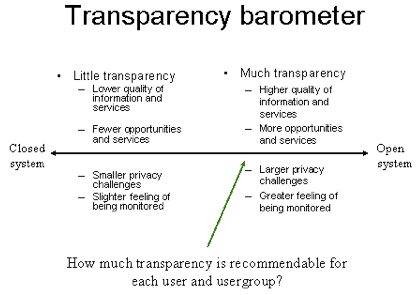Unit 3: Activity 1
[2] Cooperative Freedom and Transparency in Online Eductation. Presentation at Futurália Lisboa 12.03.2010
In this presentation the author says that: we can chose betewen transparency or privacy. He argues that transparency improves quality and promotes cooperation, but students shoud be free to choose their individual privacy level.
[3] Transparency in Cooperative Education Online -Christian Dalsgaard and Morten Flate Paulsen, June 2009
The purpose of this article is to discuss the following question: What is the potential of social networking within cooperative online education?
The authors argue that transparency is a unique feature of social networking services. Transparency gives students insight into each other’s actions. Cooperative learning seeks to develop virtual learning environments that allow students to have optimal individual freedom within online learning communities. This article demonstrates how cooperative learning can be supported by transparency. To illustrate this with current examples, the article presents NKI Distance Education’s surveys and experiences with cooperative learning.
This article focus on qualities of social networking found in services such as weblogs, social networking sites, micro-blogging, and social presence tools. The basic assumption is that transparency is important to cooperative online education. People can cooperate only if they know about each other and have access to some common information and services.
In this article we can find this picture which shows a Transparency Barometer
(we can also find this picture in a Paulsen article in Seminar.net)
[4] Networks vs. groups in higher education. Anderson, T. (2008) Message posted in the Virtual Canuck blog.
In this blog entry, Terry write about students and network privacy and concludes that "Networks offer increased opportunities for the growth of social capital, for globally relevant distributed learning and for increased involvement and engagement of higher education (...) provide motivation for higher education institutions to move beyond groups."
[5] Teaching as transparent learning by George Siemens (2009) Message posted in the Connectivism networked and social learning blog.
George Siemens write " iI’ve gained much from being a transparent learner. Over the last nine years – on blogs, wikis, and recently Twitter – I’ve expressed half-formed ideas and received the benefit of constructive (and critical feedback). I generally focus on what I’ve gained, but I suspect readers of my sites and articles have gained something from the experience as well. Putting ideas out for discussion contrasts with formal “reach a conclusion and publish” model.
Watching others learn is an act of learning. When someone decides to share their thoughts and ideas in a transparent manner, they become a teacher to those who are observing.
The varying cognitive architecture of those who are new to a subject and those with significant experience provides support to the value of peer-to-peer learning. A student who has just started blogging can likely relate better to someone who is still only considering blogging. when we make our learning transparent, we become teachers. Even if we are new to a field and don’t have the confidence to dialogue with experts, we can still provide important learning opportunities to others.
the value of dialogue and discourse in learning can’t be subjugated to the view that all contributions should advance a field. Transparency in expressing our understanding, our frustrations, and our insights helps others who are at a similar stage."
[6] Tranparency in online education Sónia Valente e Telma Jesus (2010) - mpel3 colleagues
These LO summarize the view of this mpel3 colleagues point off view concerning the Transparency in online education. We can get a quick idea about this topic.
These LO summarize the view of this mpel3 colleagues point off view concerning the Transparency in online education. We can get a quick idea about this topic.
[7] Tranparency in cooperative online education José Carlos Figueiredo and Paulo Simões (2010) - mpel3 colleagues.
These LO summarize in enjoyable way one of the benefits of transparency to be able to receive feedback to improve our work and be able to contribute ideas for improving the others work.
[8] Transparency for Cooperation
Conclusion:
Transparency is fundamental to improving world learning. By sharing we are contributing to a fruitful discussion on the topic. If we receive feedback from others we can improve our work.
Transparency can also contribute to improving the others work, as they not need to start from zero. They can learn with ours goals, wins and mistakes.
There are Somme issues regarding to transparency level. No one can be forced to be always transparent. Not all people are igual and not all situations are similar.
Students should decide which information each actor (teacher, students, community, world) can see.
Students and tutors have to find a balance between transparency and privacy, regarding that transparency is related to open learning process and more transparency = more cooperative work.
Obs: All websites were accessed on May 9, at the time of publication of this post, and the quoted content remained unchanged from the initial readings.









0 comentários:
Enviar um comentário